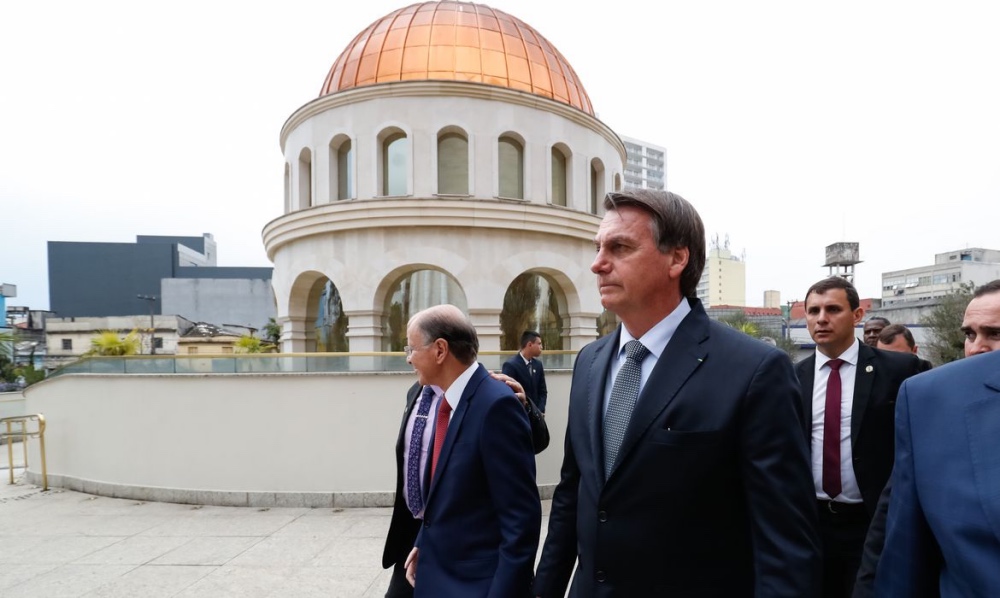
EDUARDO CAMPOS LIMA writes about the support churches are providing to Brazilian President Jair Bolsonaro as he looks to form a new political party in the nation…
Sao Paulo, Brazil
Evangelical support was critical to the election of Brazilian President Jair Bolsonaro in 2018 and after more than a year in power, not only does he still count on the endorsement of most Pentecostal and neo-Pentecostal churches – and even of some Reformed denominations – such a partnership may be essential to his plans to create his own far-right party.
In November, 2019, Bolsonaro, having left the Social Liberal Party, announced the creation of the party Aliança pelo Brasil (Alliance for Brazil), an organisation that is expected to congregate broad sectors of his political bloc, such as members of the military and police forces, conservatives, and right-wing Christians. The challenge the party now faces is to collect almost 500,000 signatures in support of its officialisation, according to the Brazilian electoral legislation. And, in order to take part in the 2020 municipal elections, Bolsonaro has to meet the requirement by the tight deadline of 4th April.

Brazil’s President Jair Bolsonaro during a visit to the UCKG’s Temple of Solomon, in São Paulo, last September. PICTURE: Alan Santos/PR.
Top evangelical leaders have reportedly offered their help to Bolsonaro in the effort of signature collecting – even opening their churches during services for party officials and allowing pastors to call for support of the initiative. Among the religious leaders outspokenly involved in such efforts is Bishop Robson Rodovalho, founder of the neo-Pentecostal church Sara Nossa Terra, which counts more than one million members. Another of Bolsonaro supporters is the Assembly of God pastor and Congressman Silas Camara.
Renan William dos Santos, a researcher at the University of São Paulo who investigates evangelicals in Brazil, says most of the churches’ assistance in cases like this has a logistical nature, as they let the party officials use their buildings for organisational activities and offer church volunteers to help in campaigns.
Top evangelical leaders have reportedly offered their help to Bolsonaro in the effort of signature collecting – even opening their churches during services for party officials and allowing pastors to call for support of the initiative.
“Most of their support comes from the backstage and not from the tribune,” he tells Sight.
Nevertheless, Bolsonaro’s drive seems to have broken through traditional barriers. A video published by the newspaper O Estado de São Paulo at the end of January showed a Presbyterian pastor in the city of Londrina encouraging church attendants to sign forms of the Aliança pelo Brasil right outside the church.
Pastor Emerson Patriota used the pulpit to say they [the church members] were “supporting this movement currently happening in Brazil for the creation of this political party…Aliança pelo Brasil, headed by our President Jair Messias Bolsonaro.”
He also affirmed that it was a good initiative, given that the party “has family values”. “[We have to] pray for everything that is going on in Brazil. We want a restoration, we want the Lord’s powerful hand, and God’s been blessing us. We, the central church, have the commitment of praying for the nation,” Rev Patriota said.
The Presbyterian Church of Brazil denied any political affiliation and said it does not approve of Rev Patriota’s attitude.
“That was a shocking case. The community understood it wouldn’t be a problem to address such theme at the tribune. But our church is not aligned with that,” Rev Juarez Marcondes Filho, pastor of the Central Presbyterian Church in Curitiba and a pre-eminent member of the institution, says.
Speaking to Sight, Rev Marcondes Filho argues that individual members of the Presbyterian Church are free to pursue a political career if they wish, but the church doesn’t ally to any political project.
The Bolsonaro administration has indeed a few Presbyterian members, such as Benedito Aguiar, president of the Coordination for the Improvement of Higher Education Personnel, a government agency that deals with higher education. Rev Marcondes Filho says none of them had been politically appointed by the Presbyterian Church to occupy positions in the government.

Brazilian President Bolsonaro during an event at the Church Sara Nossa Terra, in July, 2019. PICTURE: Antônio Cruz/Agência Brasil.
Despite the small participation of Reformed Protestants, Pentecostals and neo-Pentecostals are the most evident religious presence in Bolsonaro’s entourage. They have been part of his administration since day one and have played an influential role in his policy-making decisions.
In Congress, the so-called Bible Bloc, formed by politicians directly identified with evangelical churches – most of them Pentecostals and neo-Pentecostals – has about 200 members in the current legislature (the total number of Congressmen is 513). They’re frequently allies of Bolsonaro, approving his proposals and defending him from the opposition.
In Bolsonaro’s cabinet, one of the most visible ministers is pastor Damares Alves, in charge of a portfolio including women, family, and human rights. She was a longtime member of the International Church of the Foursquare Gospel, but a few years ago joined the Baptist Church of Lagoinha, in the state of Minas Gerais – an institution known for its Gospel music bands, which sold millions of copies.
As a minister, her proposals have often attracted criticism and she is seen by some as a fundamentalist. One of her most recent polemical ideas became public in February, when she launched a program to encourage sexual abstinence among teenagers in order to avoid adolescent pregnancy. The campaign has been broadly criticised by health specialists and marked a deep policy twist in the country – until then, the government historically invested in sexual education and prevention.
“You can’t be forced to profess Christ along with a political set of ideas. People have been expelled from their churches because they didn’t agree to vote for the pastor’s candidate.”
– Rev Ariovaldo Ramos, coordinator of the Front of Evangelicals for the Rule of Law
President Bolsonaro’s most obvious connection with the evangelical church is through his constant meetings with church leaders. In 2019 alone, according to newspaper Extra, he held 40 official encounters with bishops and pastors, both in Brasília and in church events.
In an illustration of how evangelical views have influenced government policy was evident last September when a government official suggested the creation of a tax on tithing as part of a fiscal reform. The government called meetings with church representatives and the idea was immediately abandoned, replaced by a measure that reduced tax bureaucracy for religious institutions.
In the opinion of Rev Ariovaldo Ramos, coordinator of the Front of Evangelicals for the Rule of Law, a progressive movement created in 2016 against the impeachment of the left-wing President Dilma Rousseff, such an identification of faith and political ideology is very unusual is the history of evangelicalism.
“You can’t be forced to profess Christ along with a political set of ideas. People have been expelled from their churches because they didn’t agree to vote for the pastor’s candidate,” he says.
For Ramos, the close relationship between church and state is dangerous.
“Unfortunately many evangelical leaders haven’t realised that if a new administration in the future has sympathies for other confession, they will lose everything,” he says.
Bolsonaro’s successful coalition with evangelicals was based on the idea that the Brazilian left-wing – from 2003 to 2016 the country was administered by the progressive Partido dos Trabalhadores (Workers’ Party) – was trying to destroy the traditional notion of family and to impose the so-called “gender theory” on the society as a whole, argues Ramos.
“The left-wing wasn’t doing anything like that. The description evangelicals [give] the Brazilian reality is very mistaken. They fell into the trap of exaggeration and started to see Bolsonaro’s government as the moral redemption of the country,” he says.
Bolsonaro’s new party will not represent the end of the several evangelical parties already active in Brazil, argues journalist Gilberto Nascimento, author of the book O Reino – A história de Edir Macedo e uma radiografia da Igreja Universal (The Kingdom – The history of Edir Macedo and a radiography of the Universal Church), about the founder of the Universal Church of the Kingdom of God – one of the biggest neo-Pentecostal churches in Brazil boasting almost two million members.
“Many political parties claim to be evangelical and suffer the influence of different churches. They will probably support Aliança pelo Brasil, but will keep their own identities. If Bolsonaro goes down, they will not follow him anymore.”
– Journalist Gilberto Nascimento
“UCKG has its own political party. Although he supports Bolsonaro, Bishop Edir Macedo certainly will secure more power for himself if such endorsement is exerted through his own party,” Nascimento says.
In his opinion, such logic is also valid for other churches.
“Many political parties claim to be evangelical and suffer the influence of different churches. They will probably support Aliança pelo Brasil, but will keep their own identities. If Bolsonaro goes down, they will not follow him anymore,” Nascimento says.
After a series of setbacks, President Bolsonaro assumed that his party will probably not be able to obtain an official status in 2020. But his relationship with evangelical churches seems to be a long-lasting one.
In a recent interview to newspaper O Estado de São Paulo, the most important leader of the Assembly of God in Brazil, pastor José Wellington Bezerra da Costa, affirmed that “if it’s up to the evangelicals, Bolsonaro will be re-elected in 2022″.





